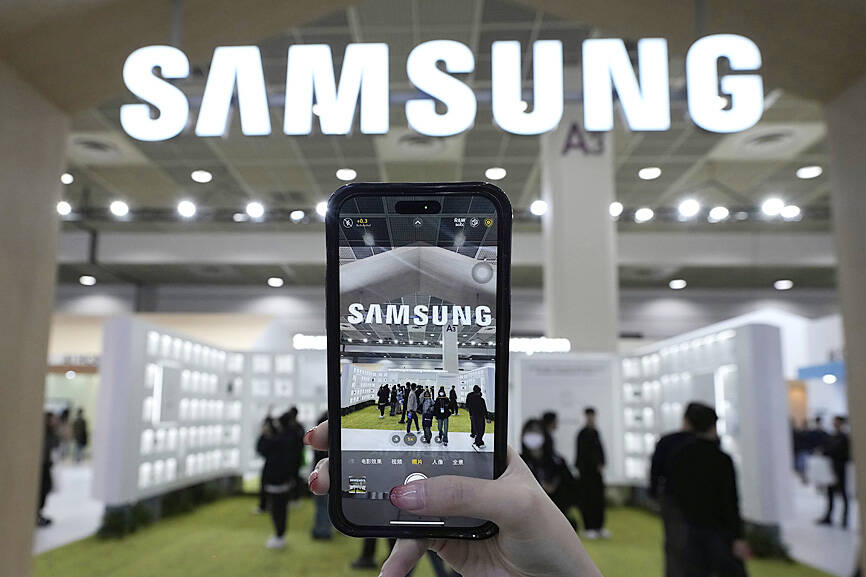South Korea yesterday announced plans to invest almost US$5 billion extra in the country’s semiconductor industry, citing “growing uncertainty” over US tariffs.
The country is a major exporter to the US and its powerhouse chip and auto industries would suffer a hefty hit from US President Donald Trump’s threatened 25 percent levies.
Concerns about the sector have hammered the Seoul-listed shares of the world’s largest memory chip maker Samsung, and largest memory chip supplier SK Hynix.

Photo: AP
Officials have now stepped up to provide more cover for the economically crucial industry by announcing that an extra US$4.9 billion would be pumped into it through next year.
“An aggressive fiscal investment plan has been devised to help local firms navigate mounting challenges in the global semiconductor race,” the South Korean Ministry of Finance said in a press release.
It warned that “growing uncertainty” following rounds of US tariff threats had left the sector clamoring for government support.
“To foster a dynamic, private sector-led ecosystem for semiconductor innovation and growth, the government will increase its investment in the sector from 26 trillion won (US$18.2 billion) to 33 trillion won,” the ministry said.
Trump announced on his April 2 “Liberation Day” sweeping tariffs on its global trading partners, including the 25 percent on South Korean goods, before backtracking and suspending their implementation for 90 days.
Even so, “duties targeting specific sectors such as semiconductors and pharmaceuticals, remain on the horizon,” South Korean Minister of Finance Choi Sang-mok said during a meeting.
“This grace period offers a crucial window to strengthen the competitiveness of South Korean companies amid intensifying global trade tensions,” he added.
“The government plans to expand support for the semiconductor industry, allocating 33 trillion won, with over 4 trillion won in fiscal spending set to be injected through 2026,” he said.
The package includes funding for infrastructure development, including underground transmission lines at semiconductor clusters that are currently being built.
“The government will boldly support investment by semiconductor companies,” Choi said, adding that the package included securing talent for the industry.
The investment is part of a large revised supplementary budget proposal of 12 trillion won and requires the approval of the National Assembly.
The tariffs announcement has rocked global markets, with investors uncertain over whether they are a negotiating tactic or permanent US position.
Trump has insisted he would not back down until he has reduced or even wiped out US trade deficits — while simultaneously signalling that he is ready to negotiate.
The US trade deficit with South Korea was US$66 billion in goods last year.
Seoul last week unveiled a US$2 billion emergency support package to help automakers weather the storm.
Still, analysts said that for now, South Korea should not be too worried about its chip sector. “Unlike automobiles, which are already subject to tariffs, semiconductors are unique in that the United States lacks viable substitutes,” Sejong University professor Kim Dae-jong said.
“Our companies are building large-scale semiconductor plants in the US, contributing to local job creation, a point that will likely be emphasized,” Kim added. “Behind-the-scenes negotiations will likely continue, and there is a chance they could conclude on a positive note. There also remains the possibility that tariffs will be adjusted item by item in the future.”

Nvidia Corp chief executive officer Jensen Huang (黃仁勳) on Monday introduced the company’s latest supercomputer platform, featuring six new chips made by Taiwan Semiconductor Manufacturing Co (TSMC, 台積電), saying that it is now “in full production.” “If Vera Rubin is going to be in time for this year, it must be in production by now, and so, today I can tell you that Vera Rubin is in full production,” Huang said during his keynote speech at CES in Las Vegas. The rollout of six concurrent chips for Vera Rubin — the company’s next-generation artificial intelligence (AI) computing platform — marks a strategic

Enhanced tax credits that have helped reduce the cost of health insurance for the vast majority of US Affordable Care Act enrollees expired on Jan.1, cementing higher health costs for millions of Americans at the start of the new year. Democrats forced a 43-day US government shutdown over the issue. Moderate Republicans called for a solution to save their political aspirations this year. US President Donald Trump floated a way out, only to back off after conservative backlash. In the end, no one’s efforts were enough to save the subsidies before their expiration date. A US House of Representatives vote

REVENUE PERFORMANCE: Cloud and network products, and electronic components saw strong increases, while smart consumer electronics and computing products fell Hon Hai Precision Industry Co (鴻海精密) yesterday posted 26.51 percent quarterly growth in revenue for last quarter to NT$2.6 trillion (US$82.44 billion), the strongest on record for the period and above expectations, but the company forecast a slight revenue dip this quarter due to seasonal factors. On an annual basis, revenue last quarter grew 22.07 percent, the company said. Analysts on average estimated about NT$2.4 trillion increase. Hon Hai, which assembles servers for Nvidia Corp and iPhones for Apple Inc, is expanding its capacity in the US, adding artificial intelligence (AI) server production in Wisconsin and Texas, where it operates established campuses. This

US President Donald Trump on Friday blocked US photonics firm HieFo Corp’s US$3 million acquisition of assets in New Jersey-based aerospace and defense specialist Emcore Corp, citing national security and China-related concerns. In an order released by the White House, Trump said HieFo was “controlled by a citizen of the People’s Republic of China” and that its 2024 acquisition of Emcore’s businesses led the US president to believe that it might “take action that threatens to impair the national security of the United States.” The order did not name the person or detail Trump’s concerns. “The Transaction is hereby prohibited,”